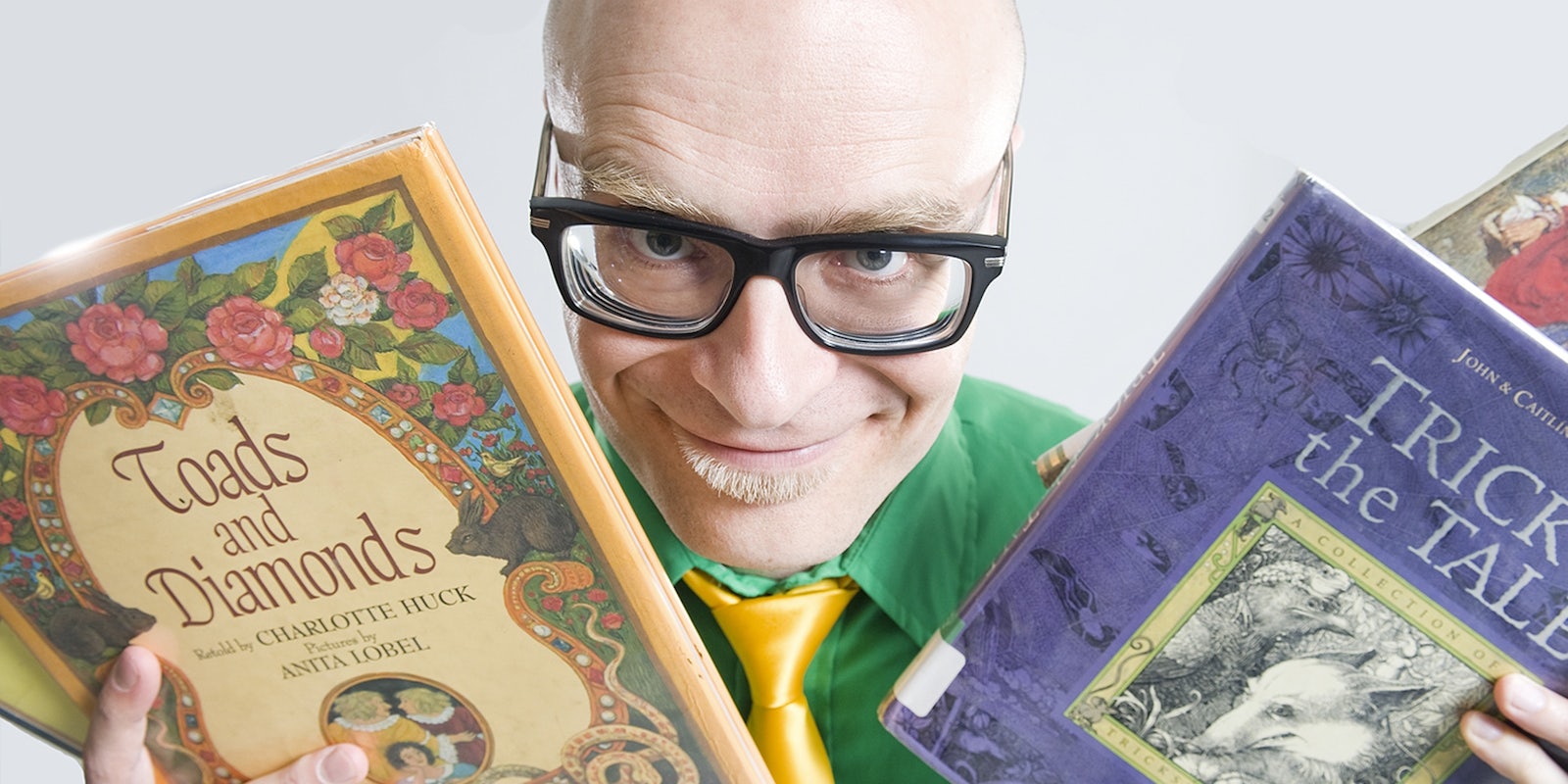Since coining the term “nerdcore” in 2000 to describe his corner of the hip-hop universe, MC Frontalot has come to be defined by his Comic-Con-friendly subject matter. Over the years, the Brooklyn-based MC has touched on certain familiar topics: video games, comic books, technology, and science fiction.
His latest album, Question Bedtime, however, contains not a single reference to code-writing or cosplay. Instead, it’s a collection of rap tracks based on folk tales from around the world that “sort of is and isn’t a children’s record.”
“It’s this weird, liminal thing,” says the rapper born Damian Hess. “I’m not sure who’s going to understand it completely right out the gate. I guess I’ll find out.”
The inspiration for Question Bedtime stretches back to Hess’s own childhood, when he obsessively read through a multivolume collection of folk tales in his middle school library.
“It was a series of maybe a dozen of these cloth-covered, hardbound books” from the early 20th century, he remembers. “They were mostly not the recognizable European ‘greatest hits’ of fairy tales. They were weirder, stranger stories with less distinct morals, and always with monsters and fairies and magic. I ate those things up.”
When he started collecting stories for Question Bedtime, he looked for those old volumes, but their titles had long since faded from memory: “I can’t for the life of me figure out what they were.” So instead, he cast a wider net, mining folklore from around the world for source material. “Two Dreamers” is a Middle Eastern folk tale from One Thousand and One Nights about a formerly rich man seeking a fortune he sees in a dream. “Wakjakaga” is based on a Native American story that explains why we have wrinkly anuses.
Suffice to say, he steered clear of certain well-worn stories. “The whole princess as femme in danger, passively receiving the benefits of some heroic male—that shit’s pretty played out,” he explains. “And then there’s everything that Disney’s ever done… I don’t want anyone to get this record and be like, ‘Oh, he’s making songs out of Disney movies.’”
For many of his folk stories, Hess turned to another book from his childhood, an illustrated copy of World Tales by the Sufi author and scholar Idries Shah, who prefaced each tale in his book with a brief account of its many variants from cultures all over the world. “Folk tales as these things that exist in multiple brains and not in the imagination of some master artist—[as] kind of living, breathing, evolving pieces of culture—I got into that idea, too.”
Hess plays with this concept on Question Bedtime’s opening track, “Start Over,” one of the album’s few tunes based on a tale familiar to American audiences, Little Red Riding Hood. Telling three different versions of the story from three different perspectives—the wolf, grandma, and Little Red—Front is admonished after each telling by a sing-song children’s chorus: “That ain’t how it happened!”
Despite the fairytale subject matter, MC Frontalot’s trademark rapid-fire flow and love of narrative complexity remain in full effect. Many songs, like “Two Dreamers,” fly by so fast that they require multiple listens to decipher their meaning.
“It’s not like I’m opposed to creating stuff that’s easy for children to understand,” Hess says, almost apologetically. “It’s just that for some reason, I didn’t want to make an album like that.”
“I’m fantasizing that it’ll be possible for children to grow into it over time,” he adds. “I remember how thankful I was for The Muppet Show as I became a teenager and realized I’d had this one piece of children’s entertainment that didn’t talk down to me.”
Question Bedtime features its share of Muppet-like moments, especially when guest rappers bring some of the fairy tales’ most vivid characters to life. Jean Grae portrays a hilariously modernized Goldilocks on “Gold Locks”; Open Mike Eagle growls through his verses as a hungry troll on “Much Chubbier,” a retelling of the Three Billy Goats Gruff tale.
As befits its title, Question Bedtime also features a series of improvised skits on which Frontalot “babysits” various comedians, including Paul F. Tompkins and Kyle Kinane, haggling with them over the rules for their bedtime (which the comedians all do in adult personas; “Can I just do this one last W2?” Negin Farsad protests). Hess laughs as he remembers railroading Tompkins into recording his skit on short notice: “I asked him, ‘Do you want to do a skit on a rap album sometime?’ He’s like, ‘Anytime. Say the word. Anytime!’ ‘Do you mean that? Anytime?’ ‘Absolutely.’ ‘Well, how about tomorrow morning at 10:45?’ You could see the ashen look on his face. But he was extremely gracious and kind.”
Hess himself has nothing but fond memories of childhood bedtime. “I was so into being read to by my mom that I think I was pretty anxious to get into bed and start on story time. I was into Narnia.”
Ultimately, despite the departure from his usual subject matter, Hess still feels that Question Bedtime comes from a pretty nerdcore place.
“Just the fact that I think of this album as having been born 29 years ago in a middle school library, because I didn’t like going out there and playing kickball,” he says. “I think in a way that maybe makes it a nerdcore record.”
MC Frontalot photo by Ben Trivett


